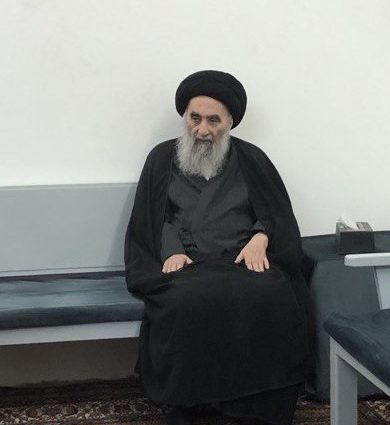Grand Ayatollah Sayed Ali Al-Sistani replied to questions about the Coronavirus vaccine
Photo by sistani.org
Subscribe to our newsletter.
By The-14
December 30, 2020
The office of the Supreme Religious Authority, his eminence Grand Ayatollah Sayed Ali Al-Hussaini Al-Sistani In Al-Najaf Al-Ashraf in Iraq received questions about the COVID-19 vaccines.
The questions were sent between 26th-27th December 2020 by the Islamic Education Department at the World Federation of KSIMC in the United Kingdom.
The Islamic Education Department at the World Federation of KSIMC received the answers on December 28, 2020.
Question 1: Vaccines against Coronavirus have already been manufactured by Pfizer, AstraZeneca & Moderna, and others are expected, or already on the market. The medical authorities of several countries have approved these vaccines and authorised mass vaccination programmes, despite some side effects. Some muqallideen are apprehensive about the vaccines’ potential side effects, as the testing & approval processes were expedited by the authorities, given the urgency of the pandemic. Some ethnic groups, based on previous negative experiences with mass vaccination programmes, are sceptical about these vaccines, although no serious side-effects have been observed in most cases. In such circumstances, what does His Eminence advise?
Answer 1: In such circumstances, it is appropriate to rely on the advice given by experienced medical experts. As per Shari’ah, it is mandatory to use an approved vaccine in a situation when the probability of suffering from the Coronavirus infection, with its potentially life threatening and/or serious untreatable complications, far outweigh the probable serious side effects of getting vaccinated.
Question 2: Governments have set up prioritisation programmes, so that high-risk groups are vaccinated first. This includes, the elderly, public safety officials and others at significant risk. Is it necessary to observe this prioritisation program, or is it permissible to jump the queue by paying money and get vaccinated earlier?
Answer 2: It is not permissible to violate the prioritization scheme if its mandated by the law of the land.
Question 3: Some developing countries may not have the financial means to procure and make available vaccines for all their citizens. If doctors recommend taking the vaccine, and if private funds do not suffice to procure, distribute and administer the vaccines inside and outside the Jamaat, would His Eminence grant permission to use religious funds for this purpose?
Answer 3: In cases where necessary there is no objection.
Question 4: If a vaccine manufacturer appeals for volunteers to participate in trials for vaccine efficacy and safety, can mu’mineen join the trial if the manufacturer gives assurance of careful monitoring and caution for the safety of the volunteers, though there may be risk of unexpected side-effects, which in some cases could be lethal?
Answer 4: If it has potentially lethal or extremely serious untreatable complications, then it’s not allowed; unless the risk is low and negligible.
Question 5: In order to stabilize the vaccine, manufacturers use several additives. Sometimes this can include porcine gelatine. Is it sufficient to rely on the manufacturers’ non-declaration, or declaration of non-usage of such gelatine? If there is a possibility of chemical transformation during the manufacturing process, is it necessary to investigate? If the amount of gelatine is not negligible, would emergency use to prevent a potentially life-threatening infection, justify its inoculation? *
Answer 5: In all (the above) circumstances there is no legal Shar’i objection.
* Both Pfizer and Moderna vaccines do not contain animal products.
Vaccines and Related Biological Products Advisory Committee December 17, 2020 Presentation – Emergency Use Authorization (EUA) Application for mRNA-1273 (fda.gov))


